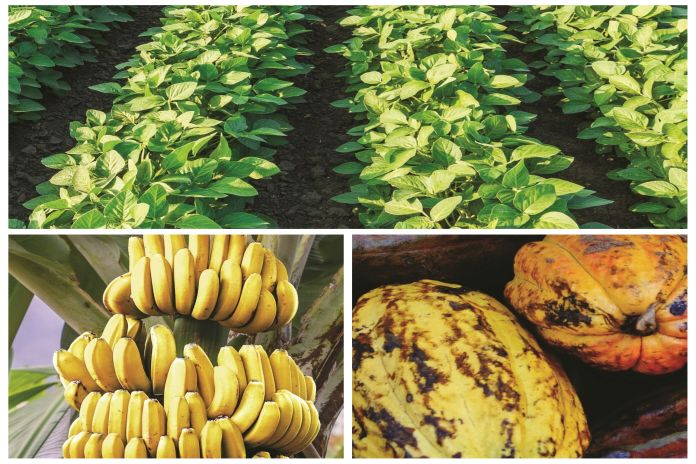- See the latest annual State of Sustainable Markets report, its new multimedia editionand the Sustainability Dashboard – a package with fresh insights on standard-compliant agricultural and forestry products, from the world’s leading sustainability standards.
GENEVA, Switzerland – The State of Sustainable Markets 2023: Statistics and Emerging Trends, is the seventh update of this unique global report. It is published by the International Trade Centre (ITC) in cooperation with FiBL, the Research Institute of Organic Agriculture and the International Institute of Sustainable Development, supported by SECO, the Swiss State Secretariat for Economic Affairs. Sustainability standards are third-party-assessed norms and requirements linked to environmental, social, ethical and food safety issues.
The report covers agricultural sustainability standards data from 4C, Better Cotton, Bonsucro, Cotton Made in Africa, Fairtrade International, GLOBALG.A.P., IFOAM (Organics International), ProTerra Foundation, Rainforest Alliance, the Roundtable on Sustainable Palm Oil,d the Round Table on Responsible Soy Association and UTZ. The forestry sustainability standards data are from the Forest Stewardship Council and the Programme for the Endorsement of Forest Certification.
The Sustainability Standards Dashboard underpins the data analysis in a dynamic, graphic format. Scroll the report highlights in the multimedia State of Sustainable Markets 2023 edition.
Growth continues, unevenly
While overall growth continues, sectors vary greatly. The minimum certified area for the eight agricultural products reviewed grew by 7.1 percent in 2020–2021. The 12 sustainability standards cover nearly 8 percent of the world’s total land dedicated to the agricultural products covered in the report. Oil palm and cotton saw robust growth; there were modest gains in tea and bananas and notable declines in coffee and cocoa.
Cocoa and coffee still lead among the sectors with total land dedicated to sustainable standards – with 29.9 percent of all cocoa land certified as sustainable, and 25.1 percent for coffee.
Organic labels lead in terms of overall area certified, reflecting consumer demand for healthy food products. Organic farmland remains the biggest sustainability standard in terms of both area and product variety. Still, only 1.6 percent of the world’s total farmland is organic. That’s about 76.4 million hectares – more than double the size of Germany.
Amid global efforts to tackle climate change, ‘businesses embracing sustainability standards can demonstrate their responsible corporate citizenship and position themselves as frontrunners in navigating the evolving legal terrain’, said ITC executive director Pamela Coke-Hamilton.
Sustainability standards help address challenges ranging from labour issues and loss of biodiversity in the banana and sugarcane markets to deforestation, soil erosion and agrochemicals in the tea sector. There are more than 400 such standards across the globe. National and regional governments, especially in developed markets, are influenced by these standards as they shape their own regulations.
Key challenge: Supply–demand imbalance
The report predicts that growth will continue, especially if emerging markets and producing countries, particularly in Asia, get on board. Standards that directly target mainstream adoption within a particular sector largely drive growth and market acceptance, the report finds.
A big challenge for most standard-compliant markets is that supply outpaces demand. Some certified goods, such as palm oil and soybeans, are not even labelled as such. When this happens, farmers miss out on premium prices and struggle to maintain their certifications.
The ‘big four’ in land growth: Cotton, oil palm, cocoa and sugarcane
The top four in growth of certified crops remain cotton, oil palm, cocoa and sugarcane. The land area used to grow certified cotton expanded by 30 percent in 2017–2021. At least 6.7 million hectares of cotton – or 20.3 percent of the global cultivated cotton area – are certified, followed by oil palm (3.4 million hectares), cocoa (2.5 million hectares) and sugarcane (2.3 million hectares).
Forestry certification continued to slow in 2020–2021, expanding 2.9 percent after 4 percent growth in 2019–2020. A total of 11.4 percent of forests were certified in 2021, little changed from 11.3 percent in 2020.
All but three of the standards examined in the report expanded their certified areas in 2017–2021, most of them by double digits, and four – Rainforest Alliance, Better Cotton, the Round Table on Sustainable Palm Oil and GLOBALG.A.P. – each covered more than 4 million hectares in 2021.
Insights: Agricultural products
The report also offers short stories with trend analysis in the following areas:
- Demand for certified goods has picked up, following a slowdown due to the COVID-19 pandemic;
- Certified bananas have buoyant sales, with room to grow;
- Cocoa marketing needs to target new consumers;
- Coffee consumers seek ethical choices;
- Cotton producers see a shift towards sustainable clothing;
- Soybean value chains struggle with traceability;
- Sugarcane sales drop amid health concerns;
- Tea producers find opportunities in India and China.





